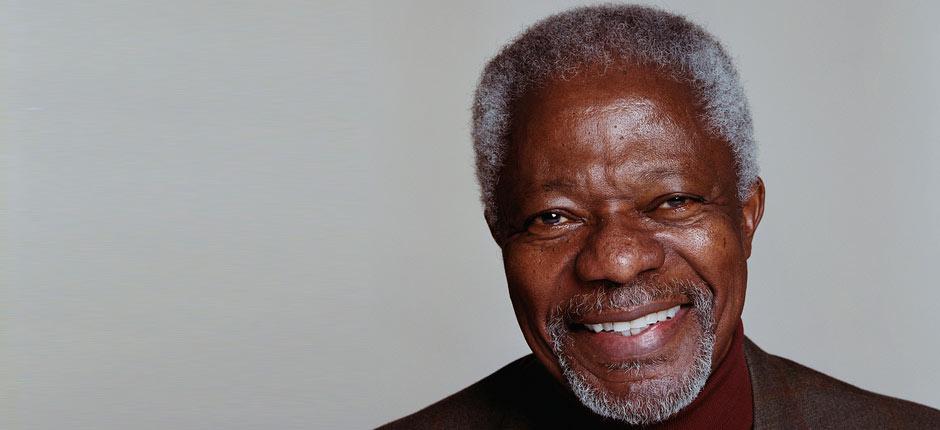T-VINE talks to former Turkish Cypriot Chief Negotiator Ergün Olgun about his memories of former UN Secretary-General Kofi Annan, who passed away on 18 August after a short illness aged 80. Annan came closer than any international political figure to resolving the decades-old Cyprus Problem, overseeing a referendum to reunite the island in 2004.
One thorny problem on Kofi Annan’s schedule when he became UN Secretary-General in January 1997 was the longstanding Cyprus Issue. The United Nations had become involved in Cyprus’ political affairs as far back as 1964, when it was given a mandate by the international community to send a peace-keeping force to the island to stop brutal attacks against the smaller Turkish Cypriot community by their political partners the Greek Cypriots, who had forcefully seized control of the Republic of Cyprus in December 1963.
Ergün Olgun, who met Annan on many occasions as a senior member of the Turkish Cypriot negotiating team, recalls his view of the UN’s elder statesman:
“Annan was very calm and an excellent listener, a man of dignity, self-control and conciliation. And he was brave.
“I would go so far as to say that with the passing of Kofi Annan, the Turkish Cypriot people have lost a rare friend, who supported the lifting of economic and social embargoes imposed on us for decades.
“Despite the frequent UK objections to arrangements that would annoy the Greek Cypriots and turn them against the British Sovereign Base areas, and the Russians who feared a settlement could lead to [Cyprus’] NATO membership, Annan tried to develop bridging proposals that would meet the approval of both sides leading to the UN Comprehensive Settlement Plan of April 2004.

After consulting the leaders of both sides in the run-up to the new millennium, Annan resolved to reunite Cyprus. In November 1999, he appointed Alvaro de Soto, a Peruvian diplomat, as his Special Adviser on Cyprus, who presided over an intense period of negotiations that lasted over three years and produced a detailed plan running into thousands of pages about how a newly formed bi-zonal, bi-communal federal Cyprus would function and how the two Cypriot communities would share power.
The UN’s blueprint for a united Cyprus received backing from the three Guarantor nations and international community, but also needed the support of Cypriots to avoid the fate of a dozen earlier UN Cyprus plans and be consigned to the history bin. For the first time in their history, both communities were going to decide the future of their island through a simultaneous referendum, allowing Greek Cypriots and Turkish Cypriots to each have their say on whether the ‘Annan Plan’ was approved or not.
This extraordinary vote was scheduled for 24 April 2004, a few days before the island was set to enter into the European Union. The world held its breath, hoping that one of the world’s most intractable problems had finally been resolved. It was not to be.
“After the rejection of Annan’s Comprehensive Settlement Plan in the 2004 referendum by a margin of four to one by Greek Cypriots, despite its approval by a majority of three to one by Turkish Cypriots, Annan was blunt and brave in expressing his deep disappointment.
“In his report of 28 May 2004 to the UN Security Council, Kofi said of the embargoes “…this referendum vote has undone whatever rationale might have existed for pressuring and isolating Turkish Cypriots” (para. 90), and he called for them to be lifted. He added, “…I would hope they [the Security Council] give a strong lead ………….. to eliminate unnecessary restrictions and barriers that have the effect of isolating the Turkish Cypriots and impeding their development, deeming such a move as consistent with Security Council resolutions 541 (1983) and 550 (1984)” (para. 93).
The UN Secretary-General was also unequivocal in his criticism of the intransigence of the Greek Cypriot side, as Olgun recalls.
“[In his May 2004 report] Annan suggested the reason there had been no Cyprus settlement was that Greek Cypriots were not interested in sharing power with Turkish Cypriots. [Annan wrote] “If the Greek Cypriots are ready to share power and prosperity with the Turkish Cypriots in a federal structure based on political equality, this needs to be demonstrated, not just by word, but by action” (para. 86)..”
However, Annan’s attempt to help end the now unjustified international isolation of Turkish Cypriots was thwarted by Greek Cypriots and their longstanding ally Russia. Olgun explains:
“One of Annan’s bridging proposals was the concept of the ‘virgin birth’ of the new state, to enable the two communities to maintain their political identity. But this was opposed by the Greek Cypriots; while Russia vetoed the endorsement of Annan’s report, which meant the embargoes [on Turkish Cypriots and their North Cyprus homeland] continued.
“The result is that despite their rejection of the Annan Plan, [on 1 May 2004] the Greek Cypriots became members of the EU as if they represented the whole island, while contrary to Kofi Annan’s best efforts Turkish Cypriots remain internationally isolated and the Cyprus Issue is still with us.”
Additional reporting by İpek Özerim.
Main photo © The Elders of Kofi Annan, who chaired the group until his death.




